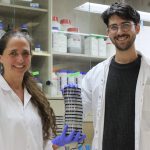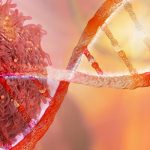Tag Archives: Living Cell
Biology in Motion at Super-High Resolution

The research group of Professor Yoav Shechtman from the Technion – Israel Institute of Technology Faculty of Biomedical Engineering has developed groundbreaking technology enabling scientists to see dynamic processes in living cells. Their study was recently published in Nature Methods. Prof. Yoav Schectman Until now, high-resolution microscopy enabled researchers to observe sub-cellular structures such as… Read More
All Eyes on Stem Cells

Can stem cells be identified and monitored in mature tissue? How do our organs cope with both the need for frequent renewal of tissue cells and the need to protect stem cell health in tissue that is exposed to environmental hazards? Collaboration between two research laboratories in the Rappaport Faculty of Medicine at the Technion… Read More
Teaching Microbes Their Letters

In a recent breakthrough, scientists from the Technion Faculty of Biomedical Engineering were able to achieve recognition of specific geometric patterns – for example, letters – by engineered microbe colonies imitating an artificial neural network. The scientists’ method relies on a modification of the way communication occurs within microbe colonies in nature. The study, led… Read More
Bone and Soft Tissue Repair

Substantial tissue loss can be the result from different causes, including cancer, injury, and infection. Reconstructive surgery attempts to mitigate the damage. Currently, the clinical “gold standard” in the field of reconstructive surgery is the autograft, which entails harvesting tissue from one part of the patient’s body, and transferring it to the damaged site. For… Read More
Machine Learning for Antiviral Drugs

Why are there no drugs that can cure COVID-19, SARS, or the flu? Why is it that if you have strep throat, you get prescribed an antibiotic, but with a virus, you are told to sit it out? In short, why are there no antivirals in similar quantity, variety, and effectiveness as antibiotics? Unlike antibiotics,… Read More
How does a Protein Recognize its Specific Binding Site on DNA?

DNA can be seen as a cookbook, containing all the recipes needed by the human body. But how is a particular “recipe” picked out? How is it bookmarked? What decides how many portions are cooked? How do some recipes have variants, like a ravioli recipe might have alternative fillings? How are comments written on the… Read More
Evolutionary Secrets of the Microbiome

Technion researchers have discovered how a gut microbiota deals with changes in habitat through reversible genetic inversion How does our gut respond and adapt to changing conditions? Where does this fundamental and critical flexibility come from? Technion scientists are unraveling the genius of the gut’s microbiome, through microbiota, all the way to genetic inversion. Assistant… Read More
60 year-old Protein-Synthesis Problem Solved at Technion

Six Decades-old Protein-Synthesis Problem Solved at the Technion: After six decades of international effort, Prof. Ashraf Brik’s group at Technion Israel achieves the ultrafast synthesis of a family of peptides and proteins, with huge medical implications Researchers led by Professor Ashraf Brik of the Schulich Faculty of Chemistry have made an important series of breakthroughs… Read More
New Pathway to Attack Cancer Cells

When treating cancer, researchers are always searching for ways to remove cancer cells while minimizing damage to the rest of the body. One possible approach is to find processes unique to cancer cells, and which would allow specific targeting. If such a process can be disrupted, only those cells would be affected. A process… Read More
Unravelling the Mysteries of mRNA
Dynamic, Sophisticated, and Environmentally Sensitive: How mRNA Formulates Its Instructions to Ribosomes Technion researchers have discovered a new mechanism in the control of protein synthesis by ribosomes: an enzyme that edits mRNA and regulates its activity according to the organism’s needs. Their recent article describes similar gene editing processes to those used by Pfizer and… Read More


